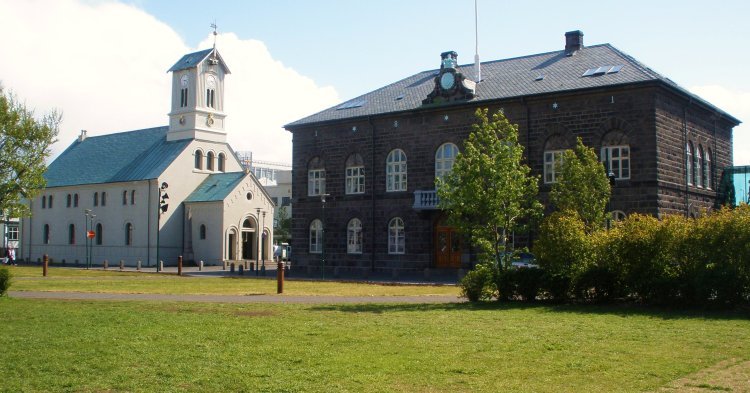The issue of totally cancelling the debt and its consequences
The debts of the three main banks of the country, Glitnir, Landesbanki and Kaupthing accounted for six times the national GDP. On its own, Iceland was not in a position to bear such an important responsibility. The three banks have been put into liquidation, which brought about bank-runs all the way to Britain and the Netherlands. This sharp debt reduction has significantly impoverished the country, bringing about a severe economic downturn. Images of deserted streets and closed stores in the capital, Reykjavik, have been shown by the European media. Since then, national authorities have set up, with some difficulties, new medium-sized banks to handle simple domestic transactions. The staggering fall in GDP seems to have finally stopped and life is slowly returning to normal. Despite some uncertainties, it seems closer to the real economy.
The contagion to the rest of the financial system has triggered a “war” between states to secure the deposits of various European customers. Indeed, Icelandic banks offered their services in neighbouring states (especially through the branch Icesave, an online bank) and many Belgian, British and Dutch citizens held accounts there. The British government did not hesitate to use a provision on acts of terrorism in order to freeze the assets of Icelandic banks on its territory and give them to its own national banks, which set off anger among the Icelandic authorities.
Facing a similar situation of hypertrophy of the public and private debt in the Eurozone, the European authorities and governments have been constantly trying since 2008 to bail out the banking sector in order to avoid such a situation. After coordinated rescue measures of several billion Euros to support banks, after schemes to limit the Greek, Irish and Portuguese public debts, the European Central Bank (ECB) has launched the last resort operation, called LTRO (Long Term Refinancing Operation). It has provided loans worth €1,000 billion to European banks at a 1% interest rate over three years.
However, this bailout policy at all costs has recently been marked by a major change: the EU governments have decided on a “voluntary” default of the Greek public debt held by private creditors, aiming at writing off €100 billion; in other words, it is the biggest post-war public restructuring. This cancellation of the debt is coupled with a massive bailout and austerity measures which merely aim at sweetening the pill for investors. The truth is that the European Union has been trying a covert experiment which may have to be renewed: an orderly default used to avoid a “war” between states and a contagion to the rest of the global financial system, and which makes private holders of the debt liable for the crisis.
The issue of personal responsibility
Icelanders seem to have a radically different approach than the one which prevails on the European continent on issues related to personal responsibility. In our continent, some leaders responsible for the collapse of Dexia, with billions of losses, rapidly find a new plum post among their competitors and even at the European Investment Bank. Furthermore, it is possible for someone to become the Minister for Economy in Spain after being an important manager for Lehman Brothers.
Meanwhile, on the small island, Icelanders have been keen to investigate and prosecute those who are responsible for the financial disaster. A genuine proof of their will to cast light on the events was given by the authorities when they hired Eva Joly as a special advisor. Indeed, she is known for her tenacity in corruption cases, especially in the Elf case. The former leaders of the three major banks which went bankrupt do no longer make public appearances while they were recently considered as respected and even deified personalities.
The personal responsibility of politicians is also being handled in an original and unique manner in Europe. The former Prime Minister Geir Haarde, overthrown by the people’s anger, is being prosecuted for crimes allegedly committed during its mandate, negligence and the inability to prevent the crisis. This is an historical first in the country.
A future EU Member State?
After having undertaken in 2008, 2009 and 2010 everything that the states of the European Union refused to do, namely debt reduction and empowerment, Iceland is about to enter the EU. Iceland is already close to the EU since it is a member of the European Economic Area and the Schengen Area. In June 2010, the European Union granted to the country the status of applicant, formally approving the opening of membership talks. The negotiations are still stumbling over the fishing policy. This understanding has been accelerated thanks to the crisis, because Iceland needed to reassure investors as well as its commercial partners and the IMF. It is a good opportunity to recall that membership of a new state to the European Union, which is a given right to every country of the continent, should not only be a complex set of obligations, but on the contrary, a dialogue in which everyone can learn from the other.


Follow the comments: |
|
